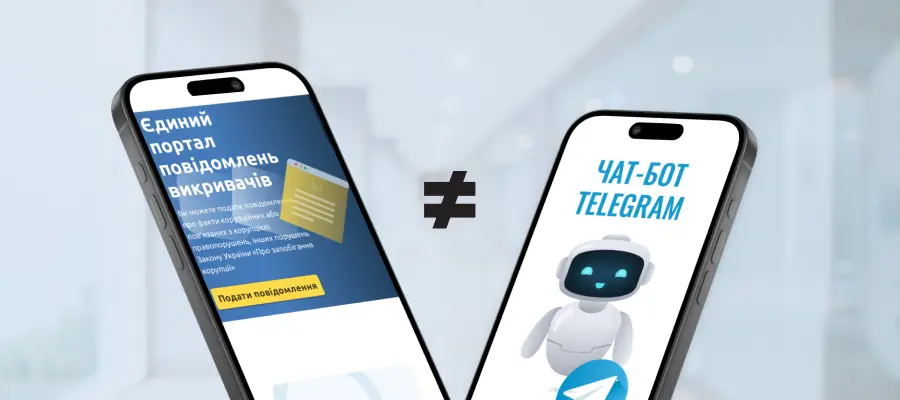
An important milestone in the development of the whistleblowing institution in Ukraine was the launch of the Unified Whistleblower Reporting Portal (“the Portal”) in September 2023. This resource allows citizens to confidentially and anonymously report possible facts of corruption that they have observed. It is a unified tool that all government organizations in Ukraine and other legal entities under public law must connect to.
Along with active connection to the Portal, public institutions are increasingly creating their channels for reporting corruption. For example, chatbots, separate portals, and other alternative resources. Could they be a reliable alternative for whistleblowers and what is their significant difference from the Portal?
The Law of Ukraine “On Prevention of Corruption” defines three channels for reporting corruption, corruption-related offenses, and other violations of this Law: internal, regular, and external.
Internal channels include the Portal and a special telephone line. They provide for the possibility of secure reporting within the organizations where the whistleblower works, serves, is trained, or is commissioned to do work, primarily by informing the head of such organization or the Commissioner for the Prevention of Corruption.
Other alternative channels within organizations are their voluntary projects, which allow them to be more open, but at the same time free to handle information received through such services, as the law does not regulate the operation of such tools and does not guarantee whistleblowers' protection of their confidentiality and anonymity. In addition, their creation requires additional resources, while there is already a unified tool (the Portal) that saves the budget of all institutions and organizations for developing their separate mechanism.
The issue of processing messages from chatbots and other similar resources remains at the discretion of officials who implement such tools in their organizations. There is no guarantee that it will be entered into the Portal, registered, and reviewed properly, not to mention security guarantees for the whistleblower. Such resources, without proper internal regulation, neutralize the responsibility of the public authority for handling corruption reports.
Using an alternative reporting method, the applicant will not always be able to confirm even the fact of his or her reporting, as the accounting and storage of such information is not provided for by law, so all reports may be deleted within a certain period.
Alternative channels within organizations may be appropriate and effective for various forms of additional communication in the field of anti-corruption. In particular, advisory and awareness-raising communications. That is, they can be an effective auxiliary resource, but they cannot replace the internal channels established by the law. Identification of communication channels or replacement of the channels established by law with alternative resources is unacceptable.
It should also be noted that a whistleblower may choose any method of reporting a possible corruption or corruption-related offense that is convenient for them. However, they will only be able to obtain the appropriate status and the right to protection if their report meets the requirements of the law.



